Breaking Up with Perfectionist Baking: Why I Really Stopped Baking Panettone
Oladki: Ukrainian Pancake Recipe
I had so little time to write this week—and that stresses me out! I did manage to do some writing even if it’s far from perfect. This actually ended up aligning “perfectly” with today’s theme of letting go of perfectionism and need for control.
I want to share a short personal essay that I was inspired and empowered to write after listening to on podcast. The title of my newsletter is a direct nod to Christina’s essay, On Breaking Up with Perfectionist Cooking. Christina gave me the courage to open up and share the real reasons that led me to stop baking panettone at the beginning of this year.
IT HAS BEEN ALMOST FOUR months since I last baked panettone, or as I like to call it, brioche on steroids. For those who might not be familiar, panettone is an Italian Christmas bread made with LOTS of butter, egg yolks, sugar, and inclusions such as candied orange peel, dried fruit, and nowadays lots and lots of chocolate. My obsession with panettone started in December 2019. From that point onward I didn’t stop baking panettone for the next 4 years.
There are so many reasons why panettone was so appealing to me. First of all, I love challenges. They’re fun and rewarding—even when the reward isn’t baked goods. Before my cottage bakery days, I used to pick a new baking challenge for myself almost every weekend. Everything from flan Parisien, ensaïmada, pasteis de nata, croissants, sfogliatella, cakes, cheesecakes, regional breads, you name it! Panettone is famous for being notoriously difficult to make. Many bakers, both amateur and professional, consider it one of the hardest things to bake in literally all of baking. Why? Well, it’s technically difficult, it requires mixing two doughs instead of one, it uses a special stiff sourdough starter, and it’s very temperamental. It takes 3 days to make a panettone from start to finish, with hundreds of little steps, and worst of all there are so many things that can actually ruin the final product. I remember being so excited about finally tackling this massive baking challenge.
This challenge ended up kicking my ass. I have written about the challenges and the rewarding nature of baking panettone in other places so I won’t go into that here, but I will say that this was by far the most difficult thing I have ever attempted as a home and cottage baker. It might actually be harder than translating ancient Greek, just kidding, there’s nothing harder than translating ancient Greek. Once I started though, there was no turning back. I had no idea just how big of a part panettone will become in my life. I was set.
From the very beginning, I decided to document my journey on Instagram. If you scroll all the way down, you can find my very first panettone (see below).
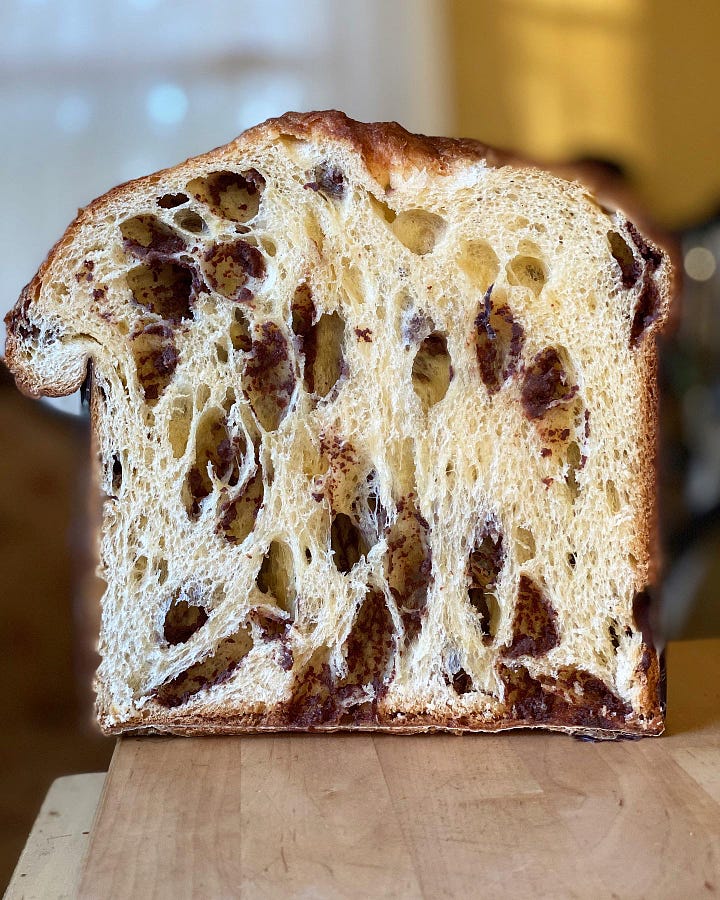
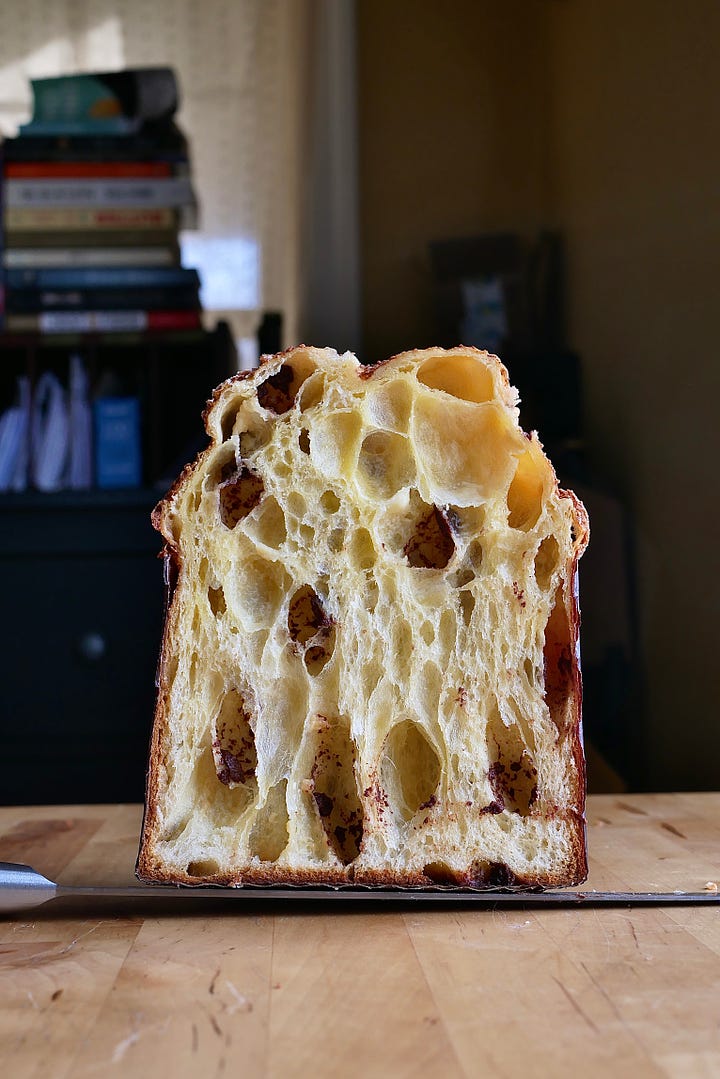
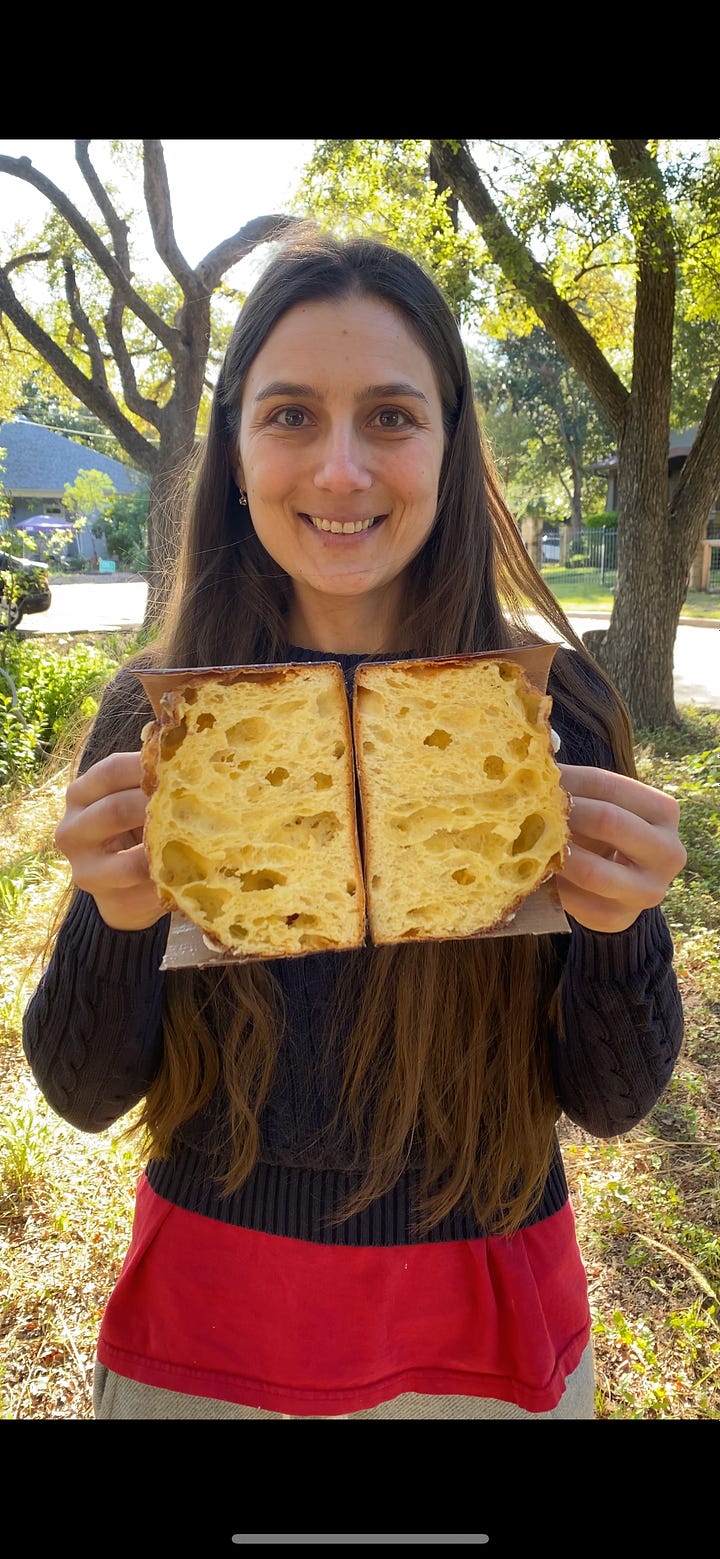
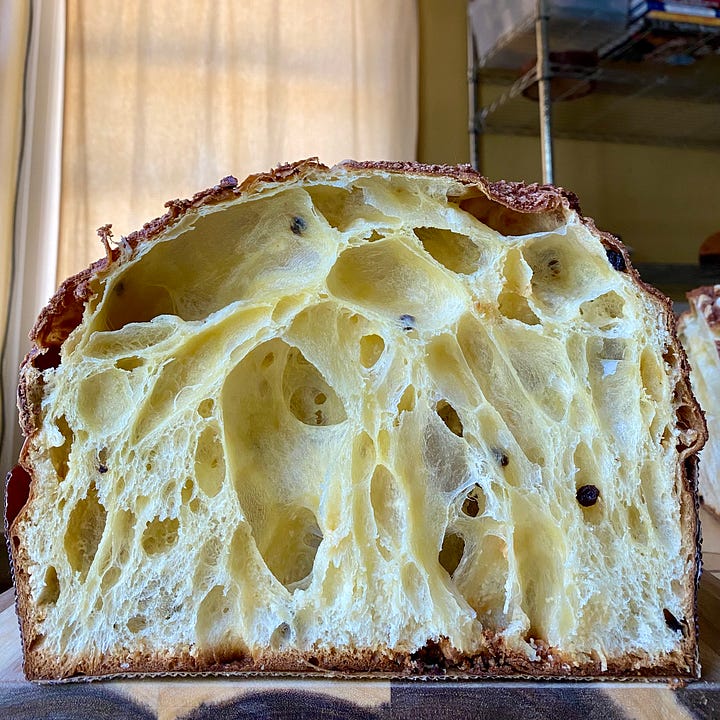
At the two year mark, my panettone reels started to generate more and more views and engagement. I started to get more positive feedback and attention from followers, fellow home and cottage bakers, professional bakers, and eventually professional panettone bakers. As I continued to post my panettone bakes, the reason for sharing panettone photos and reels has shifted away from documenting my process to something more nefarious and ego driven. I had to prove to myself that I could do it, that I could bake a “perfect” panettone.
Worst of all, I started to rely very heavily on my Panettone baking skills as my primary source of self-worth.
SELF-WORTH
In 2023, I started to notice that on days when my bakes didn’t “work out,” meaning they weren’t perfect, I felt super bad about myself. While on days when I cut open a beautifully baked panettone my self-worth was through the roof. At the same time, I became hyper focused on baking and sharing only the “perfect” looking panettone. The original goal of sharing my baking journey was superseded by the need to feed my self-worth through likes, views, and more positive comments. In 2023, when I got really good at baking panettone, I was at the height of this need for perfection and ultimately external validation.
The better I got at baking panettone, the more wrapped up it became in my self-worth. How could I let my whole identity get so wrapped up in one aspect of who I am? We are multifaceted beings. It’s not healthy for us and especially our mental health to rely so much on just one aspect of who we are no matter how much room it takes up in our lives.
I have experienced and seen this happen in a lot of forums outside of baking as well. My first profession, in some ways, was tennis. I was surrounded by professional athletes who solely defined themselves as professional athlete. Their whole self, their whole identity, was being an athlete. The same is true of graduate school and academia. Scholars have the same exact tendency as athletes. Your self-worth in academia is connected to research productivity, funding, and of course publishing! As the old phrase goes “Publish or perish,” implying that your a no body (at least in academia) if you aren’t constantly working on publishing, securing funding, or research.
Taking a break from baking panettone has reminded of the very important reason why it is absolutely necessary to separate who you are from what you do or from what you can do.
PERFECTIONISM AND CONTROL
Simultaneously, baking panettone became another expression of my perfectionism and need for control. I, as many other bakers, pastry chefs, chefs, and writers struggle with feelings of control and the need to control every little detail. Panettone was clearly feeding my control issues and lead to constant perfectionism flare-ups. How could it not! I was fixated on baking only the perfect panettone, that I deemed worthy of sharing on my social media.
I always struggled with perfectionism (more on this vast topic in future essays). Baking, and baking panettone specifically, was a goldmine for my perfectionism tendencies and it’s not surprising that it led to constant flare ups. If panettone required perfection how can I give anything less. As we all know, perfectionism is largely about control. Panettone was THE baked good that required an enormous amount of control, every variable had to be calculated, and every step of the process had to fit super narrow conditions. How could I not beat myself up for messing up the fermentation temperature and time. Objectively speaking, if those conditions were not meant, the process was compromised.
What I needed to do, if I wanted to separate my self-worth from panettone baking, I had to stop baking panettone. This was especially scary given that the majority of content I created in the last 3+ years was panettone related and I was so afraid that my audience would leave with it. Did that fear come true? No it did not. It was actually super encouraging to see that people who followed me on social media valued me or at least followed me for more than just my panettone reels. They followed me because they wanted to be on this journey with me, support me, be a part of a larger community, learn, and be entertained.
IT STOPPED BEING FUN
At the end of it all. Baking panettone stopped being fun. What started as a fun challenge where I was excited to explore, learn, research, try, experiment, and of course eat Panettone turned into me constantly trying to prove something to myself and others. I think it had something to do with wanting to show people that I was really good at something. The little old me managed to bake world-class panettone in my sad little home kitchen using an old cooler as a homemade proofer, an ancient gas oven, and worst of all I was doing all of this in the middle of sub-tropical Texas (arguably the worst climate to bake Panettone in).
Predictably, this plan did not work and achieving those things did not make me feel good about myself. Instead, I kept pushing myself to make something that was actively causing me emotional, mental, and physical pain (standing for hours over a mixer is not good for one’s neck by the way). How could it be fun.
My need for control, struggles with self-worth, and fixation with perfectionist baking took all the fun out of the process. It erased the real reason I was baking. I had to learn how to manage my control and perfectionist tendencies before I could enjoy baking panettone again. And so that’s exactly what I ended up doing.
CONCLUSION
Taking a break from baking panettone lead to something so much bigger than I originally thought. It helped me recenter and focus on doing the hard internal work that is required of us all. It forced me to confront my deep-seeded issues with self-worth, perfectionism, and need for control. This hiatus allowed me to step away, begin my healing journey, and come to the realization that creating (for me) is and never was about a perfect final product. What creating things truly means to me is expressing myself and sharing my interests with others. Panettone allowed me to see how much my self-worth was truly attached to external validation and output.
Nowadays, after taking a long break and doing a lot of healing (and therapy of course), I can start baking panettone again for fun, enjoyment, and desire to share my love for this delicious baked good once again.
Who I am is not defined by what I do and how I do it. I am enough just as I am.
RECIPE OF THE WEEK:
Oladki / Ukrainian Pancakes
Ingredient List:
250 grams kefir*
1 teaspoon baking soda
1/8 teaspoon kosher salt
2 tablespoons sugar
1 large egg
230 grams AP flour (measured out in a separate bowl)
Serve:
sour cream or creme fraiche
jam or varennya
honey
Method:
Pour kefir into a large mixing bowl. Now add baking soda, salt, sugar, and egg to kefir and using a whisk or spatula mix until the ingredients are just combined.
Now, lets start adding flour to our wet mixture 3 to 4 tablespoons at a time. We want the final batter to be a similar consistency to sour cream. Note* we don’t want to overmix the mixture! Little lumps are totally fine. The final batter should be quite thick, falling relatively slowly off the spatula. Leave the batter to rest for 15 minutes. The batter will become quite aerated.
In a non-stick pan or skillet heat up enough oil to cover the entire bottom of the pan over medium heat. Make sure to heat up the oil before adding the batter. Once the oil is hot, carefully add a large tablespoon of batter to the pan, do this until you have a pan full of oladki. I get 6 oladki in a 10.5 inch pan. Now cover with a lid and let cook until the pancakes form a skin, about 2 to 3 minutes. I like mine crispy so I fry them until they are quite brown with a nice crispy edge.
Once the skin is formed (meaning when you touch the top with your finger it will stay clean (see video) flip all oladki and cover the pan with a lid, continue cooking for 1 to 2 minutes.
Remove from heat and serve immediately. These are best served while still warm.
STEP BY STEP VIDEO:
As always please let me know if you have any questions!
*If you absolutely can’t find kefir, you can use buttermilk or soured milk instead.
Quick Note: I like my Oladki on the smaller side, if you want, you can make them larger just make sure to adjust the cooking time. In this case, I prefer to cook my oladki covered with a lid on both sides!
Tip: Once the batter has rested it will be quite aerated. We don’t want to loose all those nice bubbles. So when you go to fry the pancakes, use a large soup spoon to gently scoop out the batter and place it in the pan.
Pro Tip: Not sure if the oladki are done? Just take one and carefully tear it apart. You can also use an instant thermometer to make sure the internal temperature is around 190F.
BAKING NEWS:
NEW FLAVOR DROPS JUNE 1st AVAILABLE NOW FOR PRE-ORDER!
Peanut Butter Burnt Basque Cheesecake is now available for pre-order.

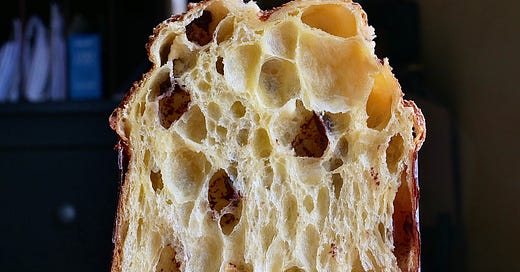


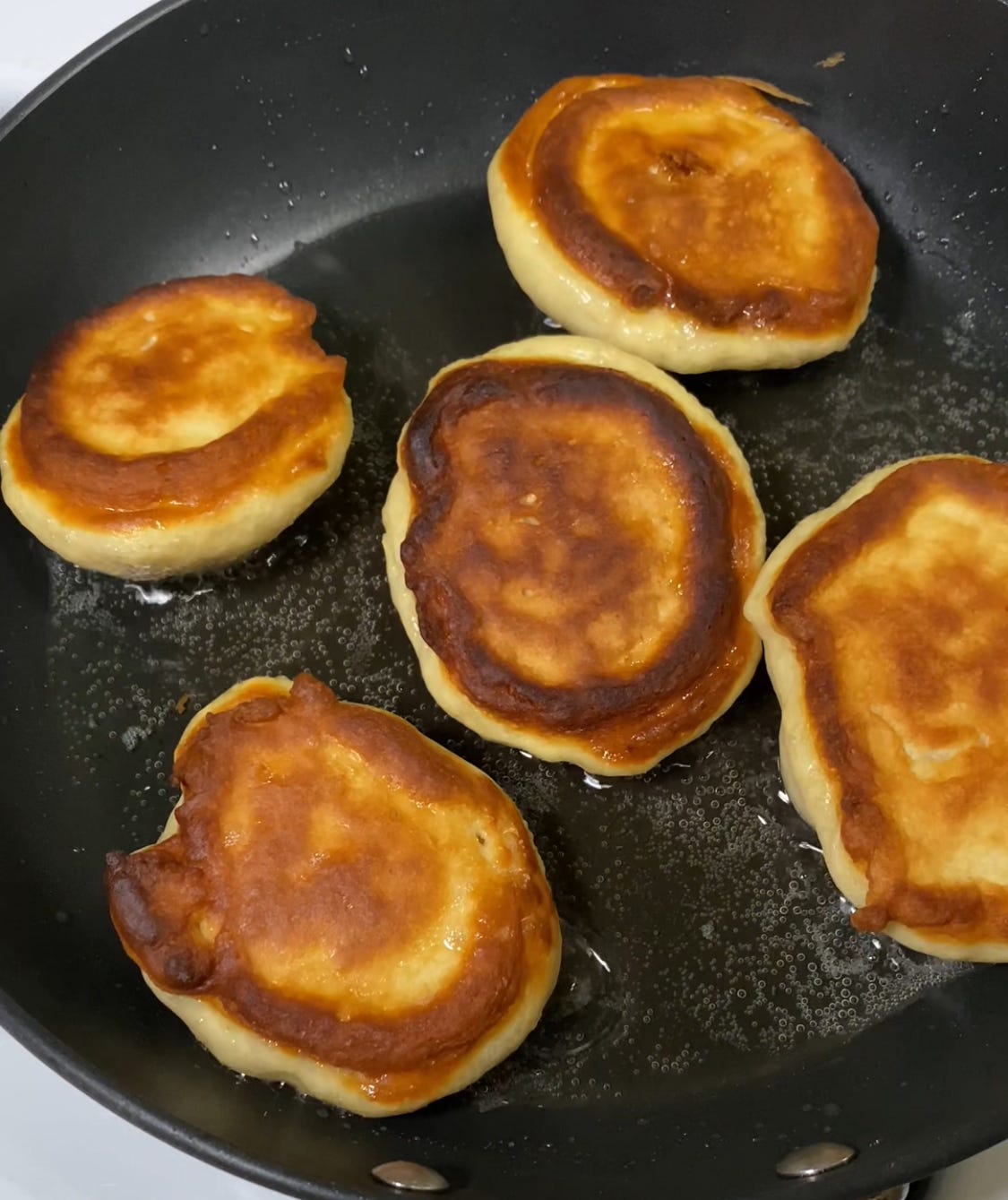
Great article! Reminded me of my focaccia phase (obviously no where near as technically difficult as a panettone) but I made a couple every week and became super obsessed with the hydration levels, proving times etc. and also had that feeling of failure when it didn’t go right.
Wow, this couldn't have resonated more with me. You should read "How to be an imperfectionist" by Stephen Guise. It's a very practical book that has a lot of proactive exercises to get out of the cycle of perfectionism. It's helped me a lot.